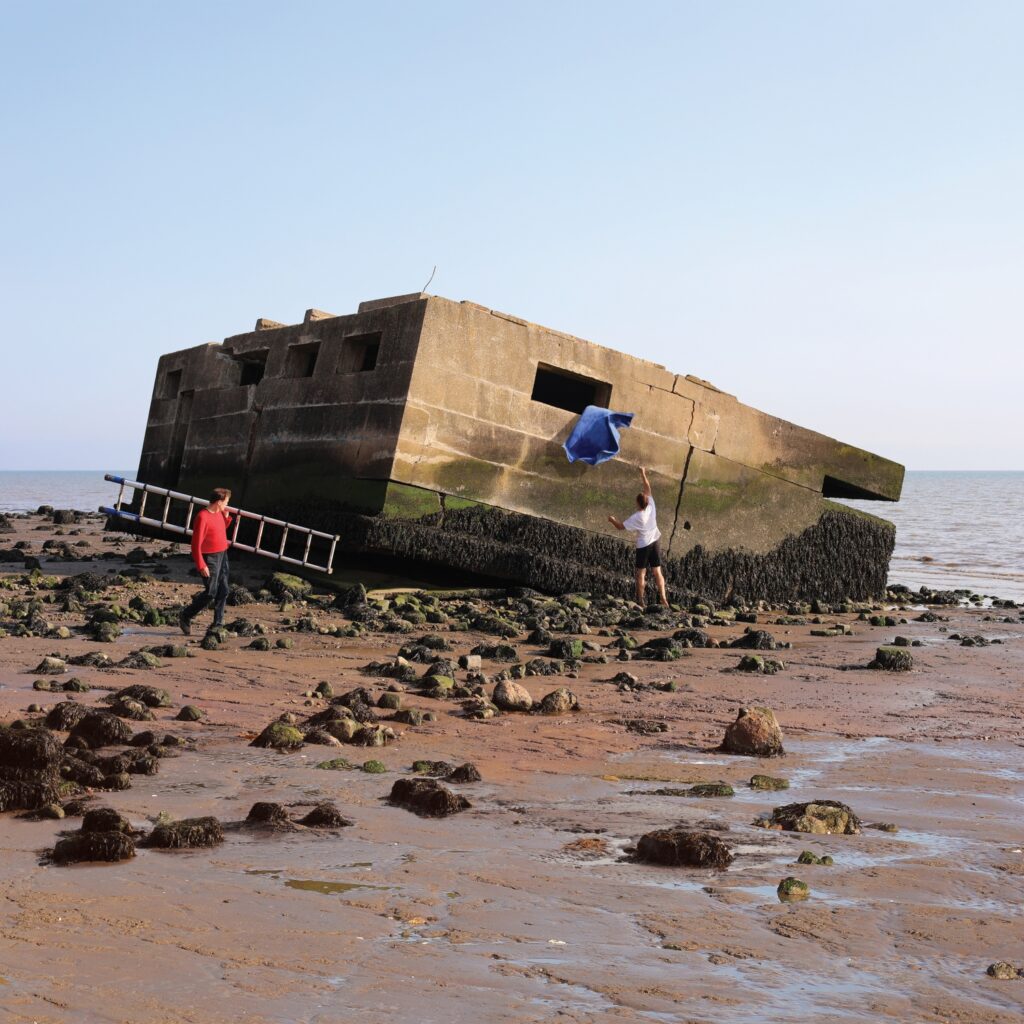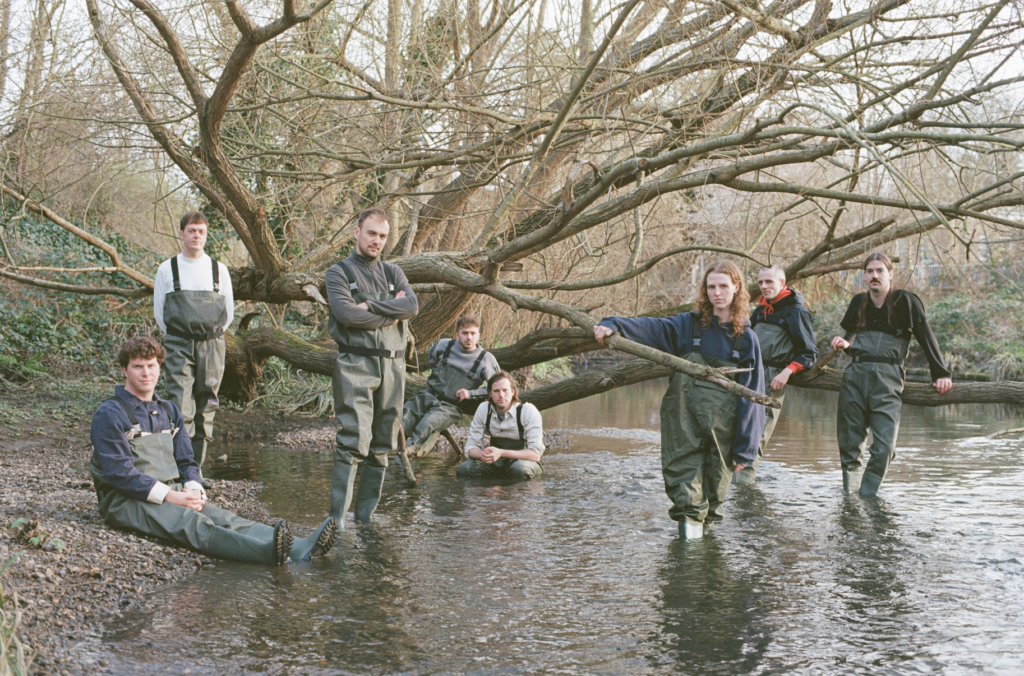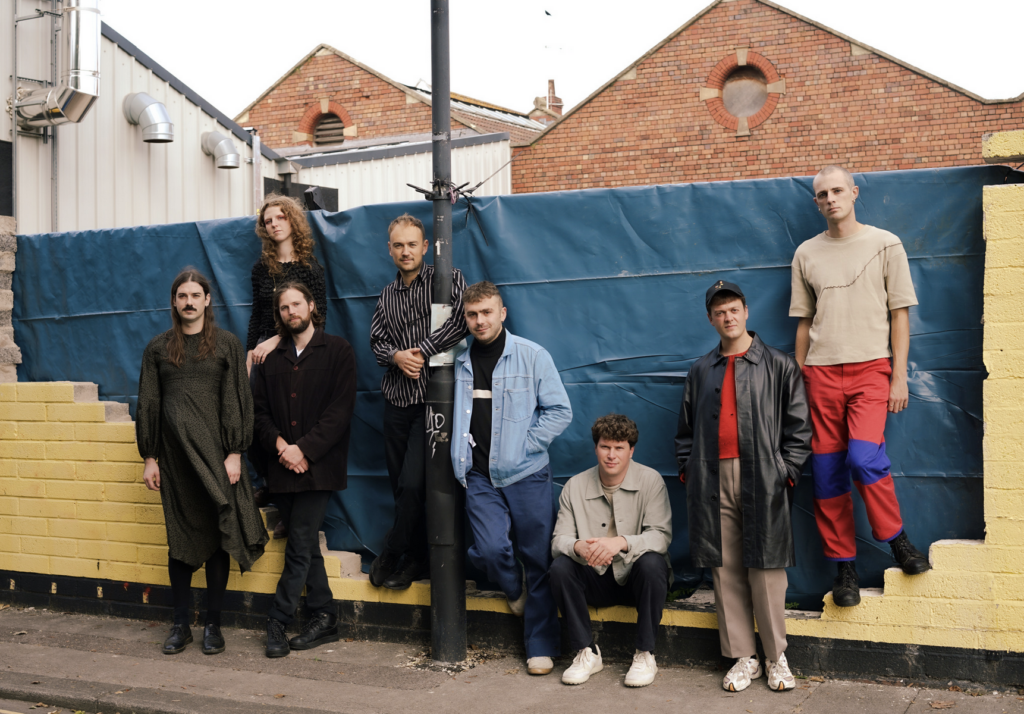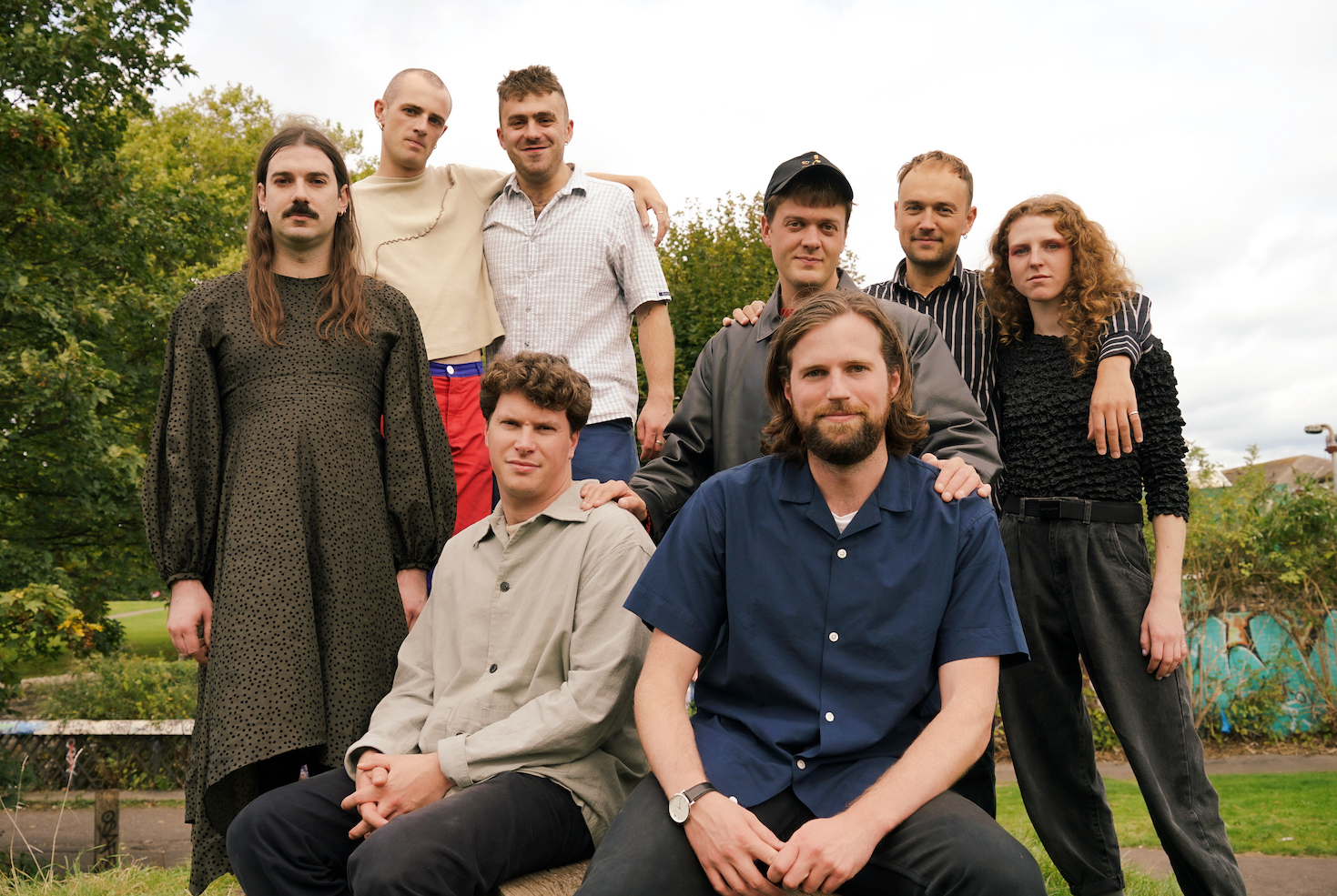Foto-© Douglas Pullman
Seit 2017 entwickelt sich unter dem Namen caroline in London eine Band, die großzügig mit ihren Einflüssen umgeht und sich stetig in der (Weiter-)Entwicklung befindet. Midwestern Emo, Appalachen-Folk, minimalistische Klassik und die abwegigsten elektronischen Auswüchse finden sich als Einflüsse auf der Genre-Palette – da verwundert auch nicht, dass die Band, die 2020 in der Kategorie „Ones To Watch“ bei den AIM Awards gerade noch so von Arlo Parks überflügelt wurde, mittlerweile ganze acht Bandmitglieder zählt. Wir sprachen mit zwei der acht Mitglieder über ihr nächste Woche via Rough Trade Records erscheinendes, selbstbetiteltes Debütalbum!
 I wanted to start by asking you about rooms. Most music is recorded in a room, and if not, the absence of a room becomes very apparent on a recording. One of the first things I noticed listening to the album was the deliberateness of how space affects the sound of your instruments. I read in The Quietus that you recorded the album in a few disparate locations. Could you talk a little bit about what led you to that decision?
I wanted to start by asking you about rooms. Most music is recorded in a room, and if not, the absence of a room becomes very apparent on a recording. One of the first things I noticed listening to the album was the deliberateness of how space affects the sound of your instruments. I read in The Quietus that you recorded the album in a few disparate locations. Could you talk a little bit about what led you to that decision?
Casper: That is something we think about quite a lot. It wasn’t deliberate to start off with, some things are recorded in our bedroom and not specifically for the album. Messen #7 was recorded in Norway where Jasper was an artist in residence, and he recorded the guitar in this big room for his own pleasure and we ended up using that. Zilch is me playing in my bedroom in 2018 or something like that – I just posted it on our group message thread and people really liked it. We did the live session in a swimming pool that’s on YouTube, and the acoustics were incredible and very distinct. Once we had done that live session, we knew we had to record something in there. Big parts of Engine (eavesdropping) are recorded in the pool.
There’s something anachronistic about the idiom you’re working in because it’s very contemporary in its stylistic sensibility but uses some very traditional sounds. And I think that bringing disparate elements together across space or time or style has a very powerful effect. Like there is a real closeness about the songs from the outset which is created by the heartbeat rhythm on Dark blue, which I think is a bass drum? But there is also this sense of vastness created by the sinister chord choice.
Casper: Yeah, I think there is something important in that the environment that you record something in is as important as the notes that you play because what the notes sound like in that space are part of the overall sound. As a listener you can sense the room and environment in which something is recorded. That’s an important part of the way we have conceptualised our music.
I saw you opening for The Microphones at EARTH a few months ago, thank you for that show it was wonderful. One of the things that caroline has in common with Phil Elverum’s music is that the project in a way is to create a universe that’s totally its own thing – your sounds deal in repetition and are quite referential and work towards this mood and world that the listener can live in. Can you talk a bit about repetition and mood and how much you’re thinking about world building when you’re writing your songs?
Mike: That’s interesting because that is probably my first thought when I realise that I really like an artist. When I feel like they have this concrete world that the music lives in which is so kind of their own thing. Which is often hard to sum up: what that world is exactly. I do think that is a fundamental basis of our writing probably.
Casper: We haven’t come at the music being like “let’s intentionally build this universe for ourselves”, but I do think that happens when you play a lot together and I don’t know…
Mike: You establish these codes between yourselves without talking about what they are necessarily.
Casper: Yeah, but I’d like to think that maybe why you think our world feels distinct is because we produce the album as well. Not just the writing process but the recording process as well is ours. Everything was decided by us. I suppose that’s a similarity with Phil Elverum – he records his own music as has control over every element of the process.
Mike: I guess that’s largely the concept of The Microphones project: including microphones and studio. The significance of where things are recorded and how you can build a song in a different way to other bands that might use studio trickery. I guess it is its own form of studio trickery.

He also takes all his own photos, and you guys have an interesting visual aesthetic too. Early on in caroline’s life there was a mysterious air around the band: you held gigs at secret locations and would post images of things like power plants, submerged cars, and shopping trolleys. I wanted to ask you how much you’re invested in photography and images as part of the band’s aesthetic.
Casper: I think imagery is really important. I don’t think any of us are any good at taking photos though. Finding the right imagery that makes sense with our music has been a really important part of the process as well.
Mike: We did take some of the cover art ourselves.
Casper: The first single, Dark Blue, you took [Mike].
Mike: Yeah, and a friend of Jasper’s took the second one and I think Jasper took the album cover.
Casper: For the majority of the time, we have been a band we have really enjoyed making things together and that’s not just the music. Everything around the band has been quite fun to do together. But we have reached a point now where we can’t do everything, we need to start devolving responsibility to other people we work with.
Mike: Like our recent [Good morning] video was the first time we just paid somebody to make a video for the song and we had one short meeting about it and then left it to him, and it was strange to not even watch it being made.
Casper: It was kind of a relief because it meant we didn’t have to spend months stressing about how we were going to get a video together when we didn’t know what we were doing, and I think learning how to collaborate with other people rather than just taking it all on for ourselves is a good thing.
Mike: Definitely. In terms of their being an element of mystery about ourselves, I don’t think that was anything we tried to cultivate. And the location shows weren’t secret for the sake of hype, it was because they were at friend’s houses and stuff and because we wanted to play in certain places because we thought it would sound good. When we tried playing at some of the venues in east London on a stage it felt really weird. It wasn’t purposefully mysterious.
Casper: We’re gonna start wearing masks when we play [laughs].
 You’ve got almost as many members as Godspeed You! Black Emperor so you can probably start playing in the dark.
You’ve got almost as many members as Godspeed You! Black Emperor so you can probably start playing in the dark.
Mike: That’s true! I’d love to play a completely pitch-black show.
Casper: But we need to be able to see each other, we could wear head torches.
Mike: That’d be cool.
There’s a sort of trade-off between aggression and sensitivity in your music where it can get very pretty and melodic and then dissonant and abrasive. Like Engine and Skydiving onto the library roof both have these intense dissonant freakouts. That juxtaposition, or the meeting of those two worlds is one of my favourite things that music can do. You obviously have an affinity for both heavy and mellow music – how do those influences play out in the song writing process?
Casper: It’s been important for us to have big dynamic shifts in our music and to have moments of loud abrasive things as well as softer things.
Mike: There’s a whole spectrum to explore.
Casper: We are into lots of loud music.
Mike: I guess something I always think of that often does those two things at the same time in parallel is black metal or melodic death metal. I do sometimes think about that when I think about things being abrasive but euphoric as well.
Casper: I suppose some of the more atonal scratchy type of stuff comes from playing free improvisational music together. That’s a way of thinking about playing that we do together and as a wider musical group of friends that’s something that we have done so that’s where that comes from. Even if things are atonal and scratchy, they have a certain energy and intention to them or a special quality that isn’t just like “here’s the kind of weird bit”.
 Going from a stripped down three piece – Jasper (drummer, vocalist, cellist), Casper and Mike – to the eight piece you are now has been a big part of the band’s growth. Now that the band has many more members and is from what I’ve read considered to be fully formed, what kind of pressure does so many members put on touring and making music? How does it make sense financially going forward?
Going from a stripped down three piece – Jasper (drummer, vocalist, cellist), Casper and Mike – to the eight piece you are now has been a big part of the band’s growth. Now that the band has many more members and is from what I’ve read considered to be fully formed, what kind of pressure does so many members put on touring and making music? How does it make sense financially going forward?
Mike: It doesn’t! [laughs]
Casper: That remains to be seen. If I’m honest it is anxiety inducing and kind of worrying. I don’t think it is a very good time in history to be an eight-person band playing music which isn’t going to be especially commercially successful. We’re approaching 30 and trying to make enough money to live, so it is something I worry about quite a lot. Other than those external pressures, it’s great, we are playing together, looking forward to touring with each other and it’s all good. But obviously money is a bit of a problem.
Are you still recording? Taking a break before the tour? Do you have plans for more releases yet or are you just looking at the European tour you’ve got coming up?
Casper: We haven’t been working on much new music yet.
Mike: We kind of talk about what we ideologically feel the next music should be like, but we don’t actually make it yet. [Casper laughs]. That’s how we’ve always worked with the music before.
Casper: We are super excited to make new music together and we have a nice new room to do it in together now.
caroline Tour:
25.04. Berlin, Silent Green
26.04. Trafo, Jena










